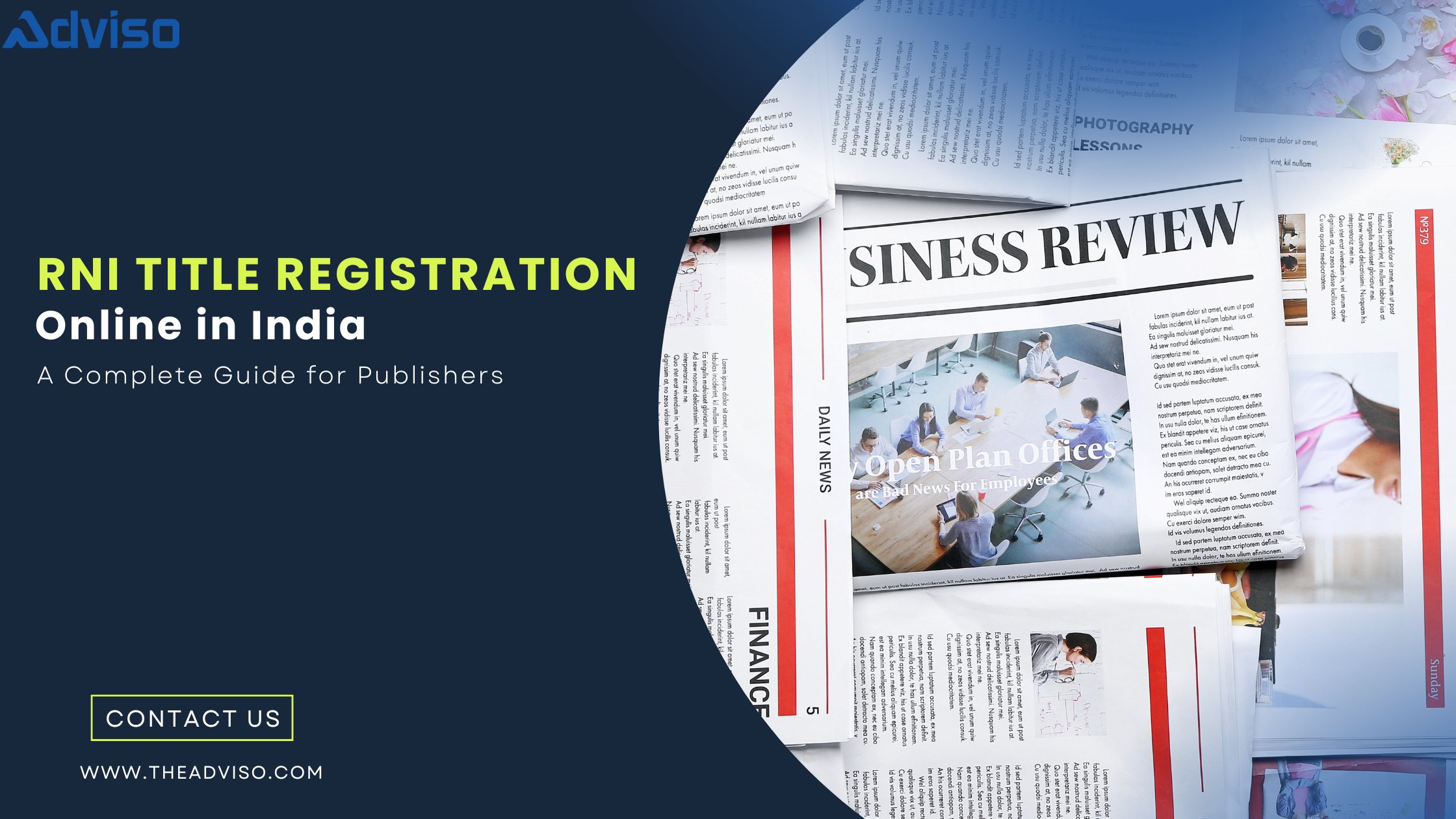RNI Title Registration Online
Although the digital media is now ubiquitous, there are a huge number of readers out there who prefer newspapers and magazines. Surprisingly, the demand for the print medium hasn’t seen a dip despite the tough competition from its electronic counterparts. Thus, the idea of starting a print media business, be it in the form of a newspaper or a magazine, cannot go wrong in 2026. If you have already geared up for this venture, this blog can help you address legalities, which primarily involve securing RNI title registration. So, brace yourself as we are about to discuss this registration and its legal nitties-gritties in detail.
What is RNI Title Registration?
Think of RNI Title Registration as a legal doorway to print media. It is a mandatory legal permit for launching a newspaper, magazine, or periodical in India. The RNI stands for the Registrar of Newspapers for India.
Can I Apply for RNI Title Registration Online?
Absolutely, the entire process is streamlined through RNI Title Registration, making it easier for publishers, agencies, and media entrepreneurs to complete registration without undergoing tedious legal procedures involving manual paperwork and filing. The online filing comes with a slew of benefits, such as:
- Faster and error-free form submission
- No physical inspection
- Seamless paperwork uploading
- Application tracking in real-time
Why RNI Title Registration Matters?
Securing RNI title registration is not just a legal requirement; it is a necessary step to avoid the duplication of business names and ensure adherence to guidelines laid out in the Press and Registration of Periodicals Act (PRP Act). The lack of this registration can lead to several complications, including
- Title misuse
- Rejection of printing permission
- Non-circulation of the publication
Thus, securing RNI Title Registration Online beforehand is a wise move.
Who Can Apply for RNI Title Registration?
Those who are interested in publishing a periodical can apply for RNI title registration. This includes:
- Individuals
- Partnerships
- Societies
- Trusts
- Private limited companies
- NGOs
- Media houses
It must be noted that the applicant must have attained the legal age, i.e., 18 years or above, to apply for this registration.
What Documents Do I need to file RNI Title Registration Online?
You will need the following documents to do so. Please note that documents may vary depending on the type of applicant.
- Proposed publication title (up to 5 options)
- Name and ID proof of the applicant (Aadhaar, PAN, or Passport)
- Provide proof of the applicant
- Declaration form (Form 1)
- Publisher details
- Printer’s agreement (submitted later during final registration)
- Place and periodicity of publication
How Can I Apply for RNI Title Registration Online in India?
Well, that is sorted! Here’s how you can apply
Step 1: Visit the Official RNI Portal
First and foremost, you must head to the RNI portal and navigate the account creation section.
Step 2: Create a New User Account
Create your account with valid contact details, such as phone no, email ID. The portal will verify your credentials before validating your request for account creation. Once approved, you must log in and head to the dashboard.
Step 3: Select the “Title Registration” Option
On the dashboard, head to the service section and click on the tab – “Title Verification” or “Title Registration”
Step 4: Submit Proposed Titles
RNI allows the applicant to propose up to five titles. The authority will cross-check these names against its database to ensure compliance. It should be noted that the following name may be rejected.
- Common or generic names
- Duplicate or misleading names
- Names that are against the Government’s interest.
Thus, proposing unique and legal names is highly recommended.
Step 5: Provide Publisher and Publication Details
Make sure they provide details, such as
- Name of publisher
- Place of publication
- Language of the periodical
- Periodicity
- Area of circulation
- Ownership details
Step 6: Upload Required Documents
Now that you have filled out the application, it is time to upload the required paperwork. Make sure that the file format aligns with portal’s requirements.
Step 7: Submit Your Application
Upon uploading the documents, submit the form and secure the acknowledgement number. This number will help you ascertain the application progress.
Step 8: Wait for Title Verification
RNI will verify the paperwork for accuracy, completeness, and compliance. Any error or mistake could lead to rejection. This assessment may last for several weeks, depending on the type of application and paperwork threshold.
Step 9: Receive Title Approval Letter
Once approved, RNI issues an online verification letter confirming your title. This letter opens the door to the next stages of registration. These include printing permission and a registration certificate.
What Should I Do After Title Approval?
Upon title approval, you must:
1. Secure the Printing Permission from the DM/SDM
Make your way to the District Magistrate or Sub-Divisional Magistrate of your area with the RNI title approval letter. They have the power to issue the printing permission. Therefore, their authentication is essential.
2. Print the First Issue of Your Publication
After receiving permission, you must print your first issue within the specified timeline.
3. Apply for Final Registration; Submit Documents
Make sure you share the following dossiers with the RNI:
- First issue copy
- Printer’s agreement
- Declaration forms (signed by DM/SDM)
- Copies of ID and address proof
4. Receive Certificate of Registration
Once RNI verifies the printed sample and documents, it will provide you with the Certificate of Registration. Congrats! Now you can officially publish and circulate your print resources without legal hassle.
Conclusion
There is no shortage of print media consumers in India, and this demand is less likely to decline in the future, making this venture a sustainable and growth-oriented one. However, as with other industries, this business is not free from legalities. Applying for RNI Title Registration is a key step toward legitimizing a print media venture.
A seamless and diligent approach is advisable when applying for this registration; otherwise, rejection is inevitable. If you are not certain whether or not to apply online, you can always contact Adviso without having a second thought.
Today, Adviso is positioned as a reliable and top-rated service provider for various licensing needs. Our expertise ranges from global incorporation to compliance-intensive licenses. We ensure a seamless experience for our clients through tailored and compliant support, ensuring you get your license in one go. Contact us for seamless licensing now!
Also Read: Recovery of Shares from IEPF: A 2026 Guide
Frequently Asked Questions (FAQs)
1. Is RNI Title Registration mandatory for all publications?
Yes. Any newspaper, magazine, or periodical circulated in India must register its title with the RNI before publishing.
2. Can I apply for RNI Title Registration from any state?
Yes. The RNI portal allows applicants from all states and union territories to register titles online without visiting physical offices.
3. How many titles can I propose at once?
You can propose up to five titles in one application. This helps improve your chances of getting at least one approved.
4. What if my proposed title is rejected?
You can submit a new application with alternative titles. Make sure the names are unique and follow RNI guidelines.
5. How long is the title approval valid?
Title approval is valid for a limited period. You must obtain printing permission, print the first issue, and apply for final registration within the stipulated timeline.




